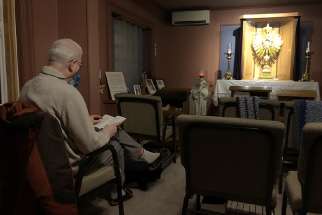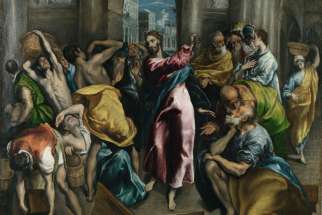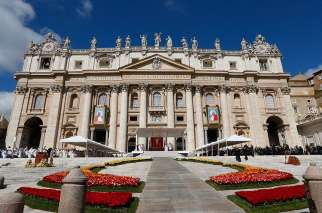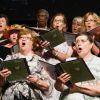Protestant discovers the peace of Eucharistic adoration
WINNIPEG – In 2008, members of Holy Cross Parish in the Archdiocese of St. Boniface had an idea for something new: 24/7 perpetual Eucharistic adoration.
The weak before God will receive the power
Third Sunday of Lent (Year B) March 8 (Exodus 20:1-17; Psalm 19; 1 Corinthians 1:18, 22-25; John 2:13-25)
The Ten Commandments are often viewed as obsolete and out of touch with the modern world. They are unfortunately treated as if they were the 10 suggestions rather than commandments. Even those who use them as weapons in the culture wars of our times are sometimes hard-pressed to name all of them.
VATICAN CITY - St. John Paul II would not want Catholics' applause, but he would want to inspire the way they live, especially in defending the family and the sacredness of human life, said Cardinal Angelo Comastri.
Sacred music can attract lapsed Catholics back to God, pope says
VATICAN CITY - Sacred music can bolster people's faith and help lapsed Catholics rediscover the beauty of God, Pope Benedict XVI said.
"Sacred music can, above all, promote the faith, and, what's more, cooperate in the new evangelization," he told participants attending a conference and pilgrimage sponsored by the Italian St. Cecilia Association. St. Cecilia, whose feast day is Nov. 22, is traditionally honored as the patron saint of musical performers.
"Music and singing that are done well can help (people) receive the word of God and be moved in a positive way," the pope said in his address Nov. 10.
Many people, including St. Augustine, have found themselves attracted to God because of some profound experience prompted by the beauty of liturgical music and sacred song, he said.
In the church's missionary outreach, he said, it urges Catholics to recognize, respect and promote the musical traditions of the local people.
Traditionally Christian countries, like Italy, have a rich heritage of sacred music which can help lapsed Catholics rediscover God and be drawn again to the Christian message and the mystery of faith, he said.
Because of their important role in new evangelization, he urged church musicians to dedicate themselves "to improving the quality of liturgical song, without being afraid of reviving or emphasizing the great musical tradition of the church, which has two of its highest expressions in Gregorian and polyphony."
"Show how the church may be the place in which beauty feels at home," he said.
"Sacred song united to the words, form a necessary and integral part of the solemn liturgy," he said, quoting from the Second Vatican Council's Constitution on the Sacred Liturgy "Sacrosanctum Concilium."
The reason why sacred music is "necessary and integral," Pope Benedict said, isn't simply for aesthetic purposes, but because sacred song "cooperates in nourishing and expressing the faith and, therefore, in glorifying God and sanctifying the faithful."
Sacred music "is not an accessory or embellishment of the liturgy, but is the liturgy itself."
The pope thanked the men and women musicians and singers for helping the faithful "praise God and make his word sink deep in their hearts."
That evening, in the Sistine Chapel, the pope attended a concert with his brother, Msgr. Georg Ratzinger, who was the director of the Regensburg Boys Choir for decades.
They listened to music from a Mass composed by Msgr. Ratzinger, as well as to pieces by Giovanni Pierluigi da Palestrina, Msgr. Massimo Palombella -- the director of the Sistine Chapel Choir -- and Colin Mawby, a contemporary British composer who has served as director of music at Westminster Cathedral.





